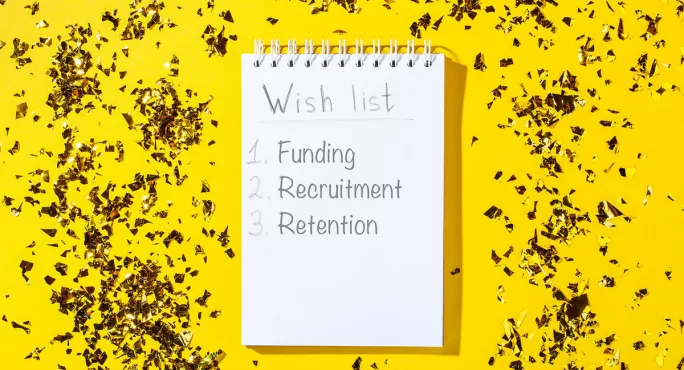Revealed: What schools want from a new government

Primary school senior leaders are most concerned about funding ahead of the general election, a survey has shown, while secondary leaders are most concerned about teacher recruitment and retention.
In a survey by the National Foundation for Educational Research (NFER), 85 per cent of primary senior leaders said school funding was one of the three most important issues informing their choice of which candidates to back at the general election in July.
In addition, 68 per cent of secondary senior leaders, 81 per cent of primary classroom teachers and 75 per cent of secondary teachers listed funding as a top priority.
Secondary senior leaders were more likely to want the next government to focus on the recruitment and retention crisis (74 per cent), according to the poll.
‘Maths to 18’ less likely to be listed
Rollout of the Advanced British Standard and ensuring pupils are studying maths to the age of 18 - which are both key policies that have been put forward by Conservative prime minister Rishi Sunak - were the least likely to be listed as important to teachers and leaders.
Less than 1 per cent of respondents listed these in their top three issues.
Pepe Di’Iasio, general secretary of the Association of School and College Leaders, said he wasn’t surprised that funding had emerged as a key issue because the financial situation facing schools “is absolutely desperate”.
“Many schools are having to set in-year deficit budgets because they don’t have enough funding and they will then have to implement cost-cutting measures to balance their books in future years,” he added.
- Background: What can schools expect from a July 2024 election?
- Funding: Behaviour tsar urges alternative provision increase
- General election: ‘Restore pupil premium funding to close disadvantage gap’
Only 2 per cent of all respondents listed increased academisation of the school system among the most important issues to them, while 5 per cent listed the Labour policy of charging independent schools VAT as a top-three issue.
Ofsted reform and SEND support
The second most important issue to teachers and leaders as a whole was reform of Ofsted and the accountability system.
Nearly two-thirds (63 per cent) of primary senior leaders listed this as an important issue for their vote alongside well over half (57 per cent) of primary teachers. However, it was less important to secondary respondents: 45 per cent of leaders and 37 per cent of teachers listed it in their top three important issues.
“Schools have been running on empty for far too long and a shortage of funding is impacting heavily on the education provision that is afforded to children and young people,” said Daniel Kebede, general secretary of the NEU teaching union.
“Cuts to staffing levels, increased class sizes, SEND support cuts, subjects dropped from the curriculum and crumbling school buildings are some of the consequences of years of underfunding by the current government,” he added.
Enough support for special educational needs and disabilities (SEND) was another important issue for respondents - though it was more likely to be listed by primary teachers and leaders (52 per cent) than secondary ones (23 per cent).
NFER chief executive Carole Willis urged all political parties to prioritise spending pledges on the education system.
Unions have been calling for the next government to fix a number of “systemic crises” in education. The Association of School and College Leaders and the NAHT school leaders’ union have both called for teacher and leader pay to be uplifted as a priority, as well as funding.
The general election will take place on 4 July.
The NFER’s survey was completed by 1,282 respondents in March 2024. This included 398 senior leaders and 884 classroom teachers.
The Conservative Party, Labour and the Liberal Democrats were contacted for comment.
For the latest education news and analysis delivered directly to your inbox every weekday morning, sign up to the Tes Daily newsletter
You need a Tes subscription to read this article
Subscribe now to read this article and get other subscriber-only content:
- Unlimited access to all Tes magazine content
- Exclusive subscriber-only stories
- Award-winning email newsletters
Already a subscriber? Log in
You need a subscription to read this article
Subscribe now to read this article and get other subscriber-only content, including:
- Unlimited access to all Tes magazine content
- Exclusive subscriber-only stories
- Award-winning email newsletters



